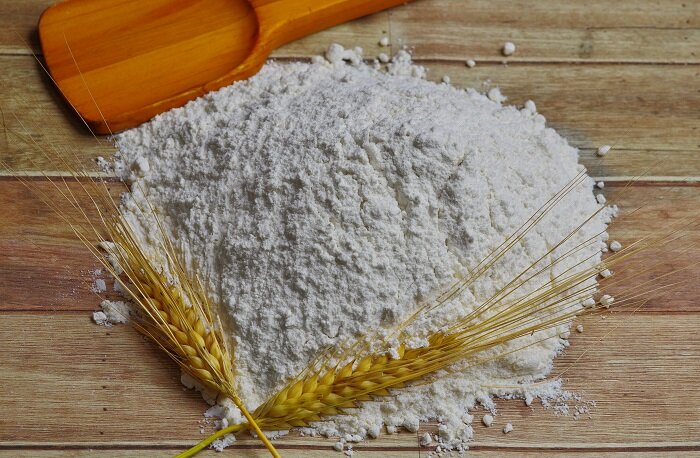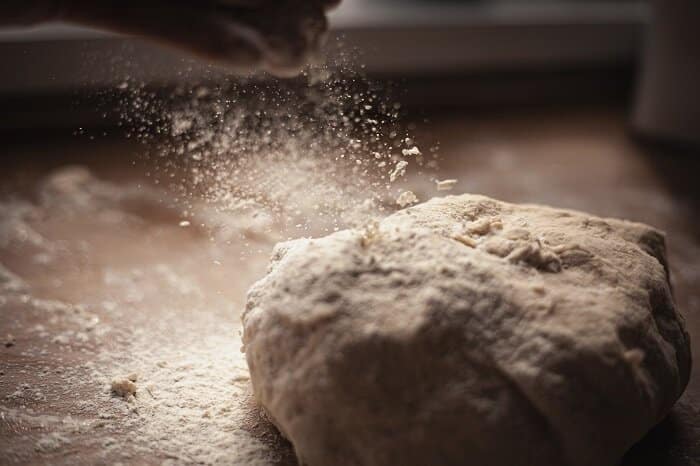It’s no secret that flour is the most important baking ingredient of them all. While it is technically possible to bake without flour, the vast majority of recipes for cakes, bread, brownies, pizzas, and much more all include flour in some form or another.
But, with so many different kinds of flour out there, you might not always know which is the right one to choose or why a certain type of flour, like bread flour is white flour, is better than another for your baked goods. So, which is the best flour for baking? Read on to find out.
What Are the Functions of Flour in Baking?
Before we look at which flour is best for baking or the best flour for bread, cakes, cookies, and more, it’s important to have a clear understanding of what flour actually does and why it’s so crucial for baking things.
So, what does flour do? Well, the main function or purpose of flour in baking is to actually hold the other ingredients together. In essence, the flour helps to bring everything else, like sugar, butter, and eggs together into a harmonious mixture of batter or dough.
The flour itself serves as a unifier and a thickener, and this is all thanks to a specific protein, known as gluten, which is found naturally in wheat, rye, and barley – the primary sources from which flour is made.
Another bonus use of flour is that it’s very handy for dusting pans and cases. You can sprinkle some into a cake pan, for example, in order to prevent the batter from sticking to the pan as it cooks.
Which Flour Is Best for Baking?
There are lots of forms of flour out there, from classic all-purpose flour to cake flour, almond flour, bread flour, and so on. So, which is the best flour for baking out of all of those different options?
Well, the truth of the matter is that the best flour for baking will depend on what it is that you actually want to bake. For example, the best cake flour for baking won’t be the same as the best flour for cookies or the best flour for bread.
It’s all about choosing the right type of flour for the situation. If you’re someone who is allergic to gluten, for example, you’ll want to find the best gluten-free flour for baking, or if you’re planning to make some diabetic cookie recipes, you’ll want to choose the best flour that is low in carbs.
However, if you’re just looking for a general flour that you can almost always rely on, all-purpose flour is arguably the best flour for baking overall. As the name suggests, it can be used for almost anything, from cookies and brownies to pancakes and pies.
Which Is the Best Gluten-Free Flour for Baking
With many people being allergic or having adverse reactions to gluten, it’s only natural that there’s a lot of demand for the best gluten-free flour. Gluten-free flours can be made from various bases, like rice, quinoa, nuts, and so on.
Some of the best options here are almond flour, which is known for its exceptional levels of nutrients and wonderful flavor, as well as buckwheat flour, which is really versatile and easy to work with, and coconut flour, which works wonders for cookies and muffins.
What Is the Healthiest Flour to Use for Baking?
If you’re health-conscious, you simply want to know how to make cookies and other baked treats in a healthier way, using better alternatives for your body. Well, there isn’t simply one flour that is healthier than all the others.
Instead, there are several flours that are healthier than the usual white flour or all-purpose flour. Oat flour, for example, is a really great choice that is very high in fiber and protein. Coconut and almond flours are also good healthy options.
Common Types of Flours for Baking
Next, let’s take a look at some of the top kinds of flour you might encounter when preparing your favorite recipes.
- All-Purpose Flour
As the name implies, this is the most versatile form of flour. It’s designed to work with almost any kind of recipe, so it doesn’t matter whether you’re making sweet treats like cookies or some Italian pizza dough, you can count on all-purpose flour to do the job.
- Cake Flour
Cake flour, as the name implies, is a great choice for baking cakes, cupcakes, muffins, and any other cake-based delights. The best cake flour for baking is really easy to work with, allowing you to simply mix your ingredients and then have fun with cake toppers and decorations without worrying about a thing.
- Bread Flour
Here’s another type of flour with a pretty self-explanatory name. Bread flour, as you might be able to guess, is best used when baking bread. It’s made from hard wheat and has lots of protein, which helps to create the high amounts of gluten needed to give the bread its rise and structure.
- Pastry Flour
Next up, we have pastry flour. This has a higher protein content than cake flour, but less than bread flour, providing a nice compromise somewhere in the middle. It’s ideal for baking the likes of pie crusts, but can also be used for making cookies and more.
- Almond Flour
If you’re looking for the best flour for cookies that is a little different from the usual suspects, try almond flour. Made from real almonds, this gluten-free flour is rich in healthy fats and is a lot of fun to work with, although you may need to experiment with different amounts to get the balance just right.
- Amaranth Flour
Amaranth flour is an alternative flour that is gaining popularity among health-conscious bakers. Rich in fiber and protein, this type of flour is a good thickener and can be used in a range of baking recipes. It’s also good to mix in with soups and sauces to make them thicker and fuller.
- Whole Wheat Flour
Usually, when flour is made, it undergoes a milling process in which the little kernels of wheat are broken down into smaller pieces, and only some of those pieces are used for making the flour. However, with whole wheat flour, all of the pieces are used, leading to a higher level of gluten and thicker, stickier dough.
- Oat Flour
Oat flour is one of the more popular alternative flours available today. Made from rolled oats, this particular kind of flour is rich in lots of interesting minerals and vitamins, making it a healthy choice. It’s good for making firm cookie dough, which is ideal when you want to play around with cookie cutters.
- Self-Rising Flour
Self-rising flour is a beginner baker’s best friend, as it rises all on its own, without the need for extra yeast or other ingredients. It’s actually just like regular flour, but with baking powder and salt mixed in. It’s a good choice for baking biscuits and pancakes.
- Instant Flour
Instant flour is a type of low-protein flour that is designed to easily blend. It undergoes a pre-gelatinization process which involves steaming and heating the flour, almost like pre-cooking it. It’s a good flour to use if you don’t have much experience in baking.
- “00” Flour
If the recipe calls for “Italian-style” flour or 00 flour, this refers to a specific kind of flour made from very hard wheat. Super high in protein and extremely fine and powdery, this flour can make a dough that can be rolled really thin, making it great for flatbreads and pizza bases.
- Coconut Flour
Last but not least, we have coconut flour. This soft flour is made from actual coconut meat. It has a unique taste and aroma, as well as quite a distinct consistency, and it’s a nice option to use when you want to make healthier cookies and cakes.





Leave a Reply